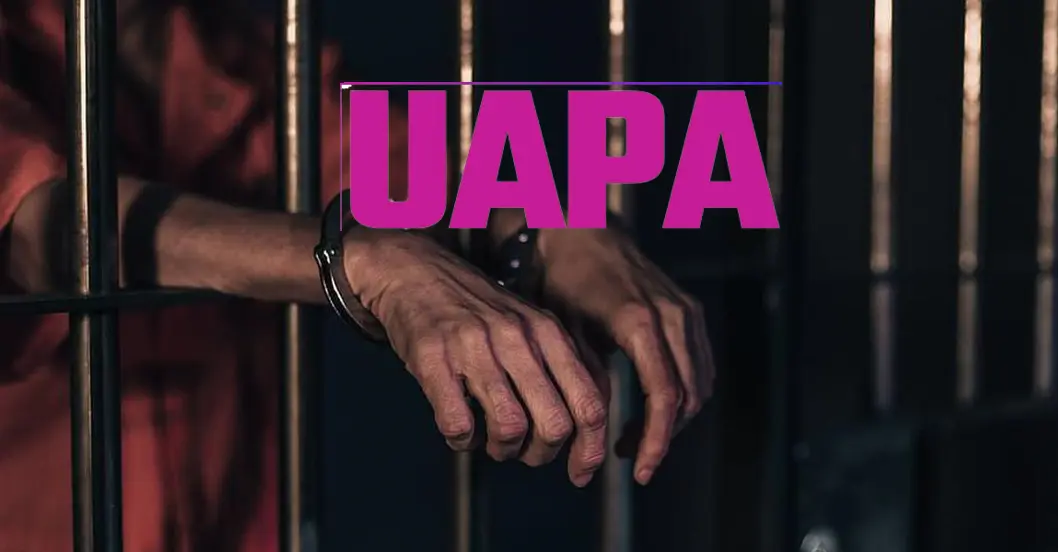About Unlawful Activities (Prevention) Act, 1967 (UAPA)
- The UAPA was introduced in 1967 as a legislation to set out reasonable restrictions on the fundamental freedoms under Article 19(1) of the Constitution, such as freedom of speech, right to assemble peacefully, and the right to form associations.
- Over the years, terror-specific legislations like the Terrorist and Disruptive Activities (Prevention) Act (TADA) and Prevention of Terrorism Act (POTA) were repealed after running into legal trouble, and the UAPA became the primary anti-terror legislation in India.
- In line with its stated objectives, the UAPA punishes the commission, funding, and support of “unlawful activities” and “terrorist acts”.
- It lays down the definitions and rules for designating an organization as an “unlawful association” if it is engaged in certain types of activities.
- ‘Unlawful activity’ is defined as any action taken by an individual or association – through an act, words, spoken or written, or by signs or visible representation – which is intended to, or supports a claim to, bring about the cession of a part of the territory of India, or the secession of a part of the territory of India from the Union, or which incites any individual or group of individuals to bring about such cession or secession.
- It covers activities which disclaim, question, disrupt, or are intended to disrupt the sovereignty and territorial integrity of India, and which cause or intend to cause disaffection against India.
- In 2004, the UAPA was amended, and ‘terrorist activities’ were brought within its fold, under which 34 outfits, including the Lashkar-e-Taiba and the Jaish-e-Mohammad, were banned.
- Under the Act, the central government may designate an organization as a terrorist organization if it:
- commits or participates in acts of terrorism;
- prepares for terrorism;
- promotes terrorism;
- is otherwise involved in terrorism;
- The 2019 Amendment gave the Home Ministry the power to designate individuals as terrorists.
- The Act extends to the whole of India.
- The UAPA applies to anyone who commits a UAPA crime in India or outside India. It applies to Indian citizens irrespective of where the crime is committed, and also includes people in Government service, and people on ships and aircrafts registered in India.
Q1) What is the punishment under UAPA?
The UAPA punishes anyone who takes part in unlawful activities, or who assists in committing such unlawful activities. If you carry out any unlawful activity, you can be punished with imprisonment for up to seven years, and a fine.For Terrorist Activities that results in death, punishment is life imprisonment, and a fine.For other Terrorist Activities punishment is jail time between 5 years and life imprisonment along with a fine.
Source: Supreme Court Allows Withdrawal Of Petitions Challenging UAPA Provisions
Last updated on November, 2025
→ Check out the latest UPSC Syllabus 2026 here.
→ Join Vajiram & Ravi’s Interview Guidance Programme for expert help to crack your final UPSC stage.
→ UPSC Mains Result 2025 is now out.
→ UPSC Notification 2026 is scheduled to be released on January 14, 2026.
→ UPSC Calendar 2026 is released on 15th May, 2025.
→ The UPSC Vacancy 2025 were released 1129, out of which 979 were for UPSC CSE and remaining 150 are for UPSC IFoS.
→ UPSC Prelims 2026 will be conducted on 24th May, 2026 & UPSC Mains 2026 will be conducted on 21st August 2026.
→ The UPSC Selection Process is of 3 stages-Prelims, Mains and Interview.
→ UPSC Result 2024 is released with latest UPSC Marksheet 2024. Check Now!
→ UPSC Prelims Result 2025 is out now for the CSE held on 25 May 2025.
→ UPSC Toppers List 2024 is released now. Shakti Dubey is UPSC AIR 1 2024 Topper.
→ UPSC Prelims Question Paper 2025 and Unofficial Prelims Answer Key 2025 are available now.
→ UPSC Mains Question Paper 2025 is out for Essay, GS 1, 2, 3 & GS 4.
→ UPSC Mains Indian Language Question Paper 2025 is now out.
→ UPSC Mains Optional Question Paper 2025 is now out.
→ Also check Best IAS Coaching in Delhi

















